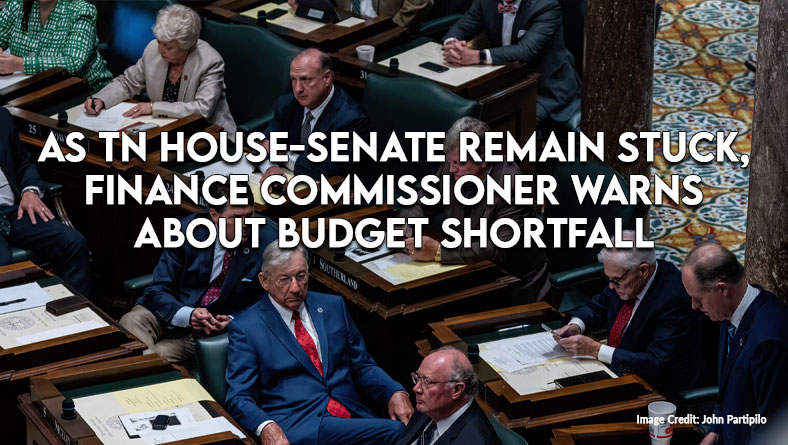Tennessee Finance and Administration Commissioner hasn’t decided on whether he would recommend passing a sales tax holiday.
Image: Members of the Tennessee Senate on Aug. 24, 2023. Image Credit: John Partipilo
By Sam Stockard [Tennessee Lookout -CC BY-NC-ND 4.0] –
Besides a House-Senate impasse over legislative “sticking points,” approving expensive bills during the governor’s special session will be difficult with the state hitting a $330 million “hole in the budget.”
Even though sales tax revenues are coming in higher than initially projected, to the tune of $2.5 billion for fiscal 2022-23, Finance and Administration Commissioner Jim Bryson last week reported a three-month shortfall to the Senate Finance committee.
From May through July, general fund growth came in at about 5.6%, slightly below the state Funding Board’s projected 6.8-7.7%. The board, which includes the state’s constitutional officers, initially set the growth rate at about 2.5%, but changed course mid-year.

It doesn’t mean the state is going broke, but it does show that state income is starting to level off a bit this spring after growth rates reached above 11% in September and October 2022. Times were so good the Legislature approved more than $400 million in tax breaks, including a permanent reduction in some business taxes and a temporary three-months sales tax break on groceries, which runs in August, September and October.
Sen. Bo Watson, chairman of the Senate Finance committee, warned colleagues following last week’s presentation they would need to tighten spending, right after they approved a $30 million worth of appropriations for the governor’s special session, $19 million for mental and behavioral health staff, $10 million for school safety officers for charter schools, and – at that point – about $236,000 to pay for the governor’s special session on public safety. He called it in the wake of the Covenant School shooting in Nashville that claimed six lives, including those of three 9-year-old students.
The House has approved nearly $150 million in spending as part of its budget during the past few days. It’s one of several sticking points between the two chambers, preventing lawmakers from ending the special session.
Watson denied having Commissioner Bryson make the dreary financial report in order to send a message to House leaders.

Senate members say they passed the governor’s special session package, which didn’t contain a bill for orders of protection, and they’re leery about approving more bills.
“It was simply to say when we come into session in January, our conversations around spending are going to have to be more disciplined than they’ve been in the past,” said Watson, a Hixson Republican.
Senate and House leaders are negotiating an end to the special session after the Senate approved four bills last week.
The House, in contrast, passed several bills last week and was to take up nearly 20 more Monday, which are among the “sticking points” described by Lt. Gov. Randy McNally last week.
House Speaker Cameron Sexton is supporting two juvenile sentencing bills, one of which is expected to cost about $11.6 million, while House Majority Leader William Lamberth is backing a measure to make autopsy reports of minors an exception to the state’s public records law, unless parents allow them to remain open. Critics say it also could close death reports on children in state custody, making it hard for the public to find out whether a child under the state’s supervision died from foul play.
The House passed the blended sentencing measure Monday evening. But Senate Majority Leader Jack Johnson said the Senate does not plan to take up any new bills.
To pass those bills, the Senate would have to reopen the Judiciary and Finance committees, something their chairmen have said they don’t want to do.

Throwing cold water on sales tax holiday next year
Asked if he would recommend against a sales tax holiday next year, Bryson said, “There’s still a lot of unknowns. We know what the history has been over the past year. … But we don’t know exactly how that’s going to impact going forward, and we’re still trying to close out last year.”
Bryson said it’s clear sales tax revenue will be lower because of the sales tax holiday on groceries, but he added that uncertainty is greater on all other types of revenue such as business taxes.
July revenues were $1.65 billion, about $153.5 million more than projected and $46.3 million than in July 2022. But annual revenues for fiscal 2022-23 fell short of the Funding Board’s revised estimate from last fall, according to Bryson.
Still, the state is having no problems closing out the fiscal year budget of $56 billion because of a combination of savings and unanticipated surpluses from other state revenue sources it can use to balance the books, according to Bryson.
The state also is operating without billions of dollars in COVID-19 pandemic funds this fiscal year.


About the Author: Sam Stockard is a veteran Tennessee reporter and editor, having written for the Daily News Journal in Murfreesboro, where he served as lead editor when the paper won an award for being the state’s best Sunday newspaper two years in a row. He has led the Capitol Hill bureau for The Daily Memphian. His awards include Best Single Editorial from the Tennessee Press Association. Follow Stockard on Twitter @StockardSam




4 Responses
TN gave $500 million to build a football stadium in Nashville.
TN gave $500 million to build a football stadium in Nashville
Looks another Tennessee Constitutional crisis in the making. We go from a massive surplus to a deficit in a few months and the hue and cry will be to end the Constitutional mandate for a balanced budget. The pigs are in the wallow and, unfortunately, it’s damn hard to get them out.
Sexton and Lamberth are TRASH!!